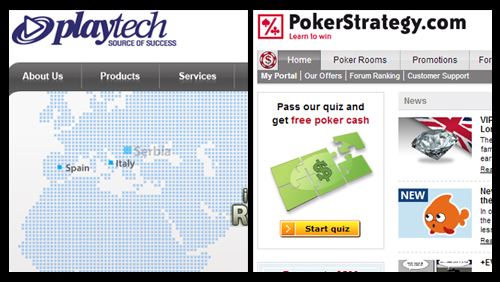 Earlier this month, affiliate organisation the etruvian group announced the decision to sell its flagship website PokerStrategy.com to Playtech in a €38.3 million deal.
Earlier this month, affiliate organisation the etruvian group announced the decision to sell its flagship website PokerStrategy.com to Playtech in a €38.3 million deal.
PokerStrategy, which capitalised on the poker boom through its multilingual education platform, community and “free $50” viral marketing campaign, has remained tight-lipped on the move.
A short statement on the PokerStrategy website insisted that operations would remain “fundamentally the same” and its status as an independent affiliate would not be compromised, in spite of a pledge to help Playtech optimise its software for the iPoker network.
It was an explanation light on the corporate motives. Black Friday underlined the poker industry’s susceptibility to indictment and regulation, and in a protracted fallout, PokerStars acquired stricken rival Full Tilt Poker. This cemented PokerStars’ market dominance, damaging the negotiating power of affiliates reliant on competition amongst operators to secure lucrative revenue shares.
As etruvian rolls out its showpiece, trading education portal tradimo, it seems that the affiliate goliath has its eyes set on pastures new. But as an interview with tradimo CEO Sebastian Kuhnert reveals, PokerStrategy is engrained in the fabric of the etruvian group and its plans to roll out new education verticals.
PokerStrategy principles shape etruvian approach
Kuhnert, who got his entrepreneurial ears wet leading the PokerStrategy Italian business unit, outlines the key tenets of the etruvian philosophy.
“We focus on three things: first, high investment into content quality; second, focus on scalability and multi-languages; third, friendly and helpful community management with topic experts and community management professionals as well as a lot of intrinsically motivated supporters.”
Articles farmed from a network of over 500 freelancers were subject to endless iterations in the quest for perfection, and in conjunction with videos and live coaching sessions, formed the backbone of PokerStrategy’s educational offerings. Customers were placed within a hierarchical status system, where access to more advanced material was proportional to rake generation. The acquisition of household poker names such as Dan “Jungleman” Cates to the coaching roster gave PokerStrategy, launched in 2007, a star-studded polish.
The onus on scalability saw PokerStrategy establish multiple business units to cater for its international presence, accepting that a prosaic approach to native content creation was warranted in order to translate and roll out material in 19 different languages. The company afforded trusted and proactive members of its forum positions of responsibility in a cost-effective style of community management.
But its trademark, and unassailable carrot in the genesis of its operations, was the $50 starting capital – a risk-free introduction to poker awarded to players upon passing a quiz. Many of its recipients became bona fide success stories, climbing the stakes to reach the nosebleeds and forming the bedrock of a loyal and interactive community.
Spectre of PokerStrategy lives on through tradimo
tradimo’s goal of democratising finance, opening up the markets to beginners and incorporating a social element into trading reflects a noble and progressive ethos. But it’s an approach incongruous with public perceptions of trading; that it’s a practice reserved for financial thoroughbreads, technical gurus and men in suits.
This may explain the company’s early difficulties in marketing to beginners. But the introduction of a €100 starting capital has sweetened the appeal, and triggered an impressive growth trajectory. Kuhnert explains:
“Over the last two months we have grown from 25,000 to 70,000 members. You have to consider that in the trading space, the largest brokers have around 150,000 traders. As such, the tradimo community is already one of the biggest places for new traders to receive support and education.”
The starting capital is one of several PokerStrategy hallmarks. tradimo has launched across British, Russian and German markets, accrued a roster of former London city traders to deliver live coaching seminars, and counts quirky video tutorials as a unique selling point ahead of rivals.
As for its acquisition strategy, tradimo has been looking from within at PokerStrategy’s pool of 6 million members. And for good reason given the symbiotic relationship between trading and poker – psychology fundamentals, money management skills and statistical interpretation are all shared faculties. Kuhnert addresses the major stumbling block to the conversion of poker players:
“They struggle to fathom how inefficient the financial market still is. Poker players are aware that they need to be better than at least one of the players on the table in order to win. They see the markets as an even playing field, where they can’t glean an edge. But trading is not a closed game like poker – it’s an open game engrained in our social world.
He continues, “At times, it is fully sufficient to just go along with the market after a central bank announcement, or after a company has placed a breakthrough innovation on the market and is rising. This is possible because not everyone who participates in the market does so to earn money. Central banks, or big companies with international operations across several currencies, simply have to be active in the market, and even expect certain losses.”
The etruvian vision and future of affiliation
The etruvian mantra of “making the world a smarter place” reflects a universal vision centred round e-learning and didactics. Poker was a means to an end – a window of opportunity and a platform on which to build – rather than an end in itself
PokerStrategy’s founders have sought to shirk the stigma attached to gambling by pursuing projects not only with a strategic core, but with tangible benefits for the customer. PokerStrategy pledged an education framework to teach you winning poker, tradimo promises financial autonomy and prosperity through understanding the markets, and impending German vertical feelgood.de will focus on healthy living.
In order to protect its brand integrity and cerebral image, etruvian has ended official association with its other new venture, casino information and bonuses portal CasinoCheck. CasinoCheck now sits under a different company name, despite being financed from etruvian coffers and ran from the group’s Gibraltar headquarters. The group was at risk of sacrificing its reputation to capitalise on its experience of b2b partnering in the iGaming field, and the cross-marketing opportunities presented by its database of poker players. Yet it was an easy corporate win during a period of transition.
If the PokerStrategy sale signalled a death rattle for iGaming affiliation, the launch of CasinoCheck proves there’s life in the old dog yet. On the future of iGaming affiliation, Kuhnert explains; “I’ve seen the first attempts to transfer the e-learning and community model to sports betting affiliation. In fact, any space in which a win-win-win situation between the customer, the operator and the affiliate exists is plausible.”
When quizzed on the allure of affiliate companies, Kuhnert elaborated, “First of all, customers are skeptical over operator attempts to create content that is beneficial to them. Does the operator just want me to spend more money, or really become the best at what I do? Secondly, the operator has one million different things to do: optimise operations, back-office, analytics, cash-flow management and marketing to name but a few.
The affiliate can jump in where the operator turns a blind eye. In etruvian’s case this is education and community. It can be other things, too. A successful company will always have a core competence, a unique selling proposition. This makes the company great. At the same time, this will leave some areas open where other companies can build a core competence and add value for the other company and its users.”
With this mentality, it seems etruvian has all the nous to diversify and explore more unconventional affiliate avenues. But in its multi-vertical journey, it hasn’t forgotten its iGaming roots.
Sam has five years of experience covering the iGaming sector, and is now Senior Editor at Right Casino Media. He blogs here.

Sam Miranda investigates the etruvian group’s decision to sell PokerStrategy.com, and talks to tradimo.com CEO Sebastian Kuhnert to learn about etruvian’s new venture. If you wish to submit your own editorial please contact Bill Beatty.
